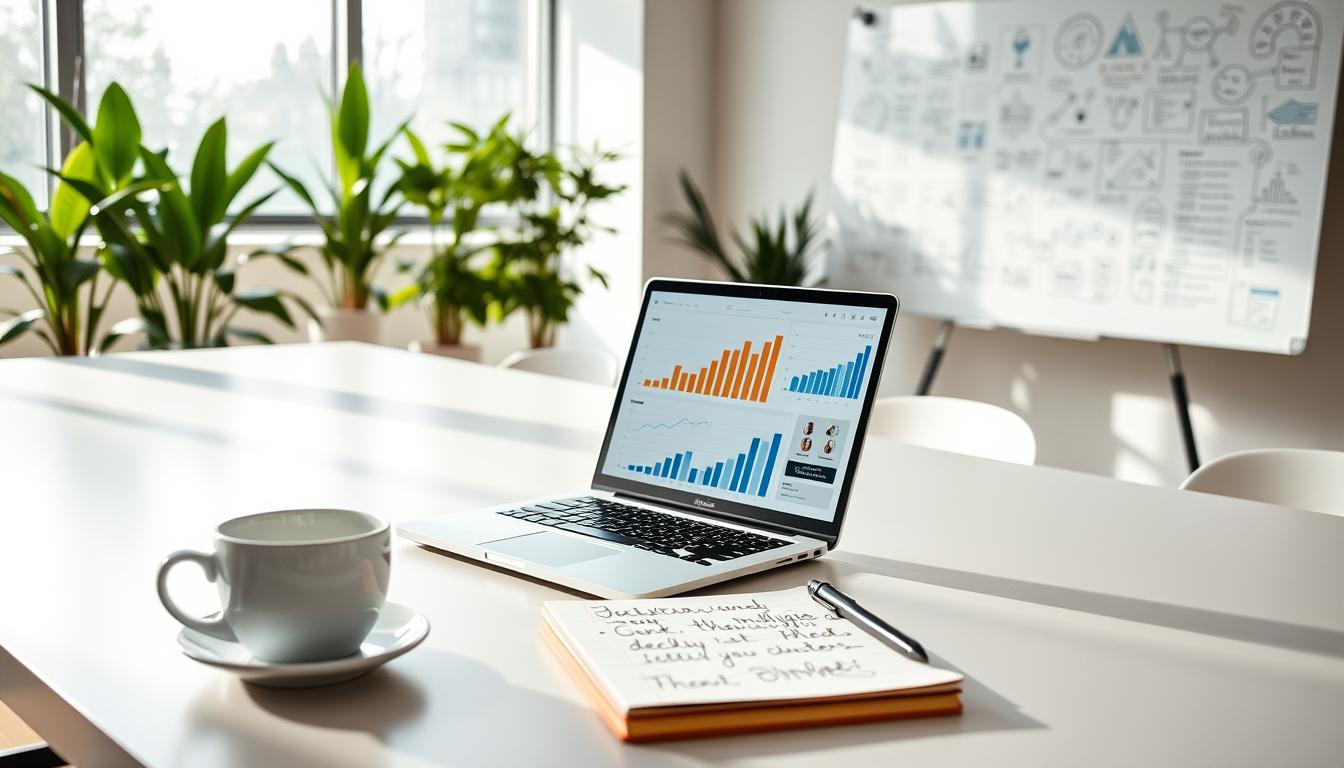Every month, the thought of paying bills makes me nervous. My first few months of managing money were tough. But I’ve found ways to make it easier. Now, I know how to handle my bills without stress.
Managing money is a journey, and paying bills is a victory. This article aims to make your journey smoother. It shares tips to help you deal with your bills confidently.

Key Takeaways
- Understanding types of bills and their statements is crucial for effective financial management.
- Choosing the right payment methods can simplify the billing process.
- Online bill payments offer modern solutions that save time and stress.
- Keeping track of expenses is key to maintaining a balanced budget.
- Scheduling automatic payments helps avoid late fees.
- Reviewing and adjusting payment plans can lead to better financial outcomes.
Understanding Your Bills
Knowing about different types of bills is key to managing money well. I deal with many bills, each with its own needs and rules. Understanding these helps me handle my money better.
Types of Bills I Encounter
I see a few main types of bills. These include:
- Utility Bills: These cover electricity, water, gas, and sewage costs.
- Credit Card Statements: Show my spending, due dates, and minimum payments.
- Insurance Premiums: Vary based on the type of insurance I have.
- Rent or Mortgage Payments: Essential for keeping a place to live.
- Subscription Services: Fees for streaming, gym memberships, and software.
Reading Your Bill Statements
Learning to read bill statements is very helpful. Each statement has important details:
- Due Dates: The payment deadline to avoid extra fees.
- Minimum Payments: The smallest amount to keep my account active.
- Charges: Breakdowns of what I used, fees, and taxes.
Understanding these helps me manage my money better. It keeps me from paying late and helps me stay in control.

| Type of Bill | Characteristic | Payment Frequency |
|---|---|---|
| Utility Bill | Variable charges based on usage | Monthly |
| Credit Card Statement | Details spending, minimum due | Monthly |
| Insurance Premiums | Fixed amount per policy | Monthly/Yearly |
| Rent/Mortgage | Fixed monthly payment | Monthly |
| Subscription Services | Recurring fee for services | Monthly/Annual |
How to Pay Bills Effectively
Making effective bill payment a part of my financial routine is key. I’ve found that knowing my payment options helps me manage my money better. Each method has its pros and cons, which I’ve learned to handle well.
Timing my payments right is also crucial. It helps me avoid late fees and keeps my credit score healthy.
Choosing the Right Payment Methods
When it comes to paying bills, I look at different methods:
- Online Payments: Fast and easy, it helps me avoid missing due dates. Most companies offer online portals for managing payments.
- Checks: It may seem old-fashioned, but writing checks gives me a physical record of payment. It makes me feel secure.
- Money Orders: This is good for payments that need guaranteed funds. It’s especially useful when you don’t have online access.
Looking at these options helps me choose the best one for me.
Timing Your Payments
Choosing the right method is just part of the equation. Timing payments correctly is also key. Here’s how I do it:
- Set reminders: I use digital calendars and reminders to stay on track.
- Review statements regularly: Keeping an eye on due dates helps me avoid late fees.
- Plan payments in advance: Scheduling payments a few days early gives me a safety net for unexpected delays.

By using these strategies, I feel more in control of my finances. It not only protects my money but also helps improve my credit history over time.
Online Bill Payments: A Modern Solution
In today’s fast world, online bill payments make managing money easy. Digital solutions have made tracking bills simple. This convenience saves me a lot of time.
Benefits of Going Digital
Online bill payments offer many benefits for managing money:
- Convenience: I can manage all my payments from one place, no need for checks or bank visits.
- Time Savings: With just a few clicks, I can schedule payments, saving time on financial tasks.
- Payment Tracking: I can easily keep track of payments, which helps with budgeting.
- Accessibility: I can access my accounts on different devices, making it easy to manage bills on the go.
Setting Up Online Accounts
To use online bill payments, setting up accounts is key. The process is easy if you have the right info:
- Choose a Provider: Look for reliable providers that offer online bill payment services that fit my needs.
- Gather Required Information: I need personal details like my bank account number, billing addresses, and ID.
- Secure My Account: It’s important to use strong passwords and two-factor authentication to keep my info safe.
- Familiarize with the Interface: Exploring the platform helps me learn how to use it and set up payment methods.

Different Bill Payment Methods
Exploring various bill payment methods can make managing my finances easier. Knowing the good and bad of each helps me pick the right one for me.
Credit Card Payments
Using credit cards for bills has its perks. It helps me manage my money better, especially when I’m short on cash. Plus, many cards offer rewards or points, which can save me money or get me perks.
I always pay off my balance in full each month. This way, I avoid paying interest.
Paying with Checks
Checks are a traditional choice that I prefer. When I write checks, I keep track of them to avoid missing payments. This helps me stay on top of my finances.
It’s important to send checks early, especially for big bills. This ensures they’re processed on time.
In-Person Payments: Pros and Cons
In-person payments give me a sense of satisfaction and allow for direct questions. However, they can take up a lot of time. I also have to think about any fees for these transactions.
Considering these points helps me decide when to use in-person payments.
Managing Expenses: Keeping Everything Organized
Tracking my monthly expenses is key to good financial management. Using strategies for tracking expenses helps me stay on top of my spending. This way, I can avoid surprises when bills arrive.
Tracking My Monthly Expenses
I use a personal spreadsheet to manage my expenses. Each month, I list all my bills and sort them. This helps me see where my money goes.
By tracking my expenses, I can spot unnecessary spending. I then adjust my budget to stay on track.
Using Apps for Better Organization
Budgeting apps also help me manage my expenses. They offer features like automatic syncing and customizable categories. Some apps I like include:
- Mint: Offers comprehensive expense tracking and budgeting features.
- You Need A Budget (YNAB): Focuses on proactive budgeting and financial goal setting.
- EveryDollar: Emphasizes user-friendly design and ease of use for expense tracking.
Using these apps makes tracking expenses easy. They help me stay organized and make smart financial choices.
| Budgeting App | Features | Best For |
|---|---|---|
| Mint | Automatic synchronization, bill reminders, investment tracking | Overall expense management |
| You Need A Budget (YNAB) | Proactive budgeting, goal setting, educational resources | Financial planning |
| EveryDollar | User-friendly design, customizable categories, expense tracking | Ease of use |
Scheduling Automatic Payments
Setting up automatic payments can change how I manage my bills. It lets me schedule payments with my service providers. This way, I don’t have to worry about forgetting to pay on time.
Automatic payments link my bank or credit card to my bills. Then, the payment is taken out automatically on the set date.
How Automatic Payments Work
To start with automatic payments, I visit my service provider’s billing website. Most sites make it easy to set up automatic payments. I enter my payment details and choose how often I want to pay.
After I confirm, I get reminders before each payment. This helps me stay on top of my budget.
Pros and Cons of Automation
There are big benefits to using automatic payments:
- Convenience: I don’t have to remember due dates, saving time and reducing stress.
- Late Fees: This method helps me avoid late fees by ensuring payments are made on time.
- Budgeting: Scheduling payments helps me plan my finances more effectively.
But, there are also some downsides:
- Overdrafts: If my account balance is low when the transaction occurs, it can lead to overdraft fees.
- Cancellation Risks: I must remember any canceled services to avoid paying for something I no longer use.
Setting a Budget for Bills
Creating a monthly budget is key to managing money and paying bills on time. I sort my expenses into categories to plan my spending. It’s important to balance fixed costs like rent with variable ones to make a solid financial plan.
Creating My Monthly Budget
I start by listing all my expenses. I prioritize essential bills first and then spend on things I want. After knowing my income, I divide it among:
- Rent or mortgage payments
- Utilities like electricity, water, and gas
- Groceries
- Transportation costs
- Insurance premiums
- Entertainment and leisure activities
This method helps me make a detailed budget that covers all my financial needs.
Adjusting My Budget Based on Expenses
My expenses can change, so I regularly check my budget. This flexibility helps me keep my finances in check while still enjoying life. To manage these changes, I:
- Keep track of any surprise expenses.
- Adjust my budget to fit new costs.
- Reduce spending on things I don’t need to stay on budget.
Being proactive with my budget has made me feel more financially secure. Remember, budgeting is a continuous process that needs updates as your situation changes.
| Expense Category | Estimated Monthly Cost | Actual Monthly Cost |
|---|---|---|
| Rent/Mortgage | $1,200 | $1,200 |
| Utilities | $300 | $350 |
| Groceries | $400 | $450 |
| Transportation | $150 | $120 |
| Insurance | $200 | $200 |
| Entertainment | $100 | $90 |
Utilizing Bill Payment Services
Exploring different bill payment services has made managing my finances easier. Finding the right service can improve my experience. It lets me focus on what’s important. With many options, I’ve compared popular services, looking at their fees and features.
Popular Bill Payment Services I Trust
I’ve tried several bill payment services that are reliable and easy to use. Here are some I recommend:
- PayPal: A user-friendly platform that offers quick transfers and automated reminders.
- Mint: Known for expense tracking, it includes features for payment scheduling and monitoring bills.
- Prism: This app consolidates all my bills in one place, making it easy to keep track of due dates.
Comparing Fees and Features
When looking at bill payment services, cost matters to me. Here’s a comparison of key features and fees:
| Service | Monthly Fee | Payment Features | Customer Support |
|---|---|---|---|
| PayPal | Free with personal accounts | Instant payments, automated reminders | Email and phone support available |
| Mint | Free | Expense tracking, bill reminders | Email support |
| Prism | Free | Bill management, due date notifications | Email support only |
The differences in payment features and customer support are key when choosing a service. Each service has unique benefits worth considering.
Reviewing and Adjusting Payment Plans
Managing my money means looking closely at my payment plans. I need to be ready to change them when life gets in the way. Talking to service providers can often help.
How to Negotiate Payment Terms
When I need to change my payment plans, I take a few steps:
- Research my options before reaching out to customer service.
- Prepare to explain my situation clearly and concisely.
- Be polite yet assertive in discussing my needs.
- Ask specific questions about potential adjustments to my payment plans.
- Document any agreements made during the conversation.
Assessing My Payment History
Looking at my payment history is also crucial. It helps me see where I can do better with money. I look at:
- Reviewing past patterns to ensure timely payments.
- Identifying frequent late payments to correct any underlying issues.
- Exploring opportunities for renegotiating terms based on my payment trends.
- Setting goals to maintain a better future payment history.
By regularly checking and tweaking my payment plans, I keep my finances in order. This helps me face any money problems that come my way.
Conclusion
Effective bill management is key to keeping my finances in check. I’ve looked into different ways to handle payments, from knowing what bills I have to using online systems. Each method has its own perks, helping me find what fits my life best.
Keeping my bills organized and making a budget helps me stay on top of my spending. Setting up automatic payments or using bill services helps me track what I owe. This way, I avoid late fees and stay financially healthy.
Using these tips makes managing my bills easier and sets me up for success in the long run. As I keep working on my bill management skills, I feel more confident about my financial future. It’s reassuring to know I’m making smart choices for my money.
FAQ
What are the best methods for paying my bills?
Online bill payments are very efficient. You can pay with a credit card, bank transfer, or checks. I also set up automatic payments to never miss a deadline.
How can I manage my monthly expenses effectively?
Start by tracking all your spending. Use apps or spreadsheets to organize your bills. This way, you can see where your money goes and adjust your spending.
Are there any risks associated with automatic payments?
Yes, automatic payments can cause overdrafts or forgotten services. Always check your accounts and adjust your payments to avoid problems.
How do I set up online bill payments?
Setting up online payments is easy. Just go to your service provider’s website, create an account, and add your payment info. Make sure to check for security to protect your info.
What should I do if I can’t afford a bill payment?
If you’re struggling, talk to your service provider. They might offer payment plans or grace periods. Being open about your situation is key.
How can I compare different bill payment services?
Compare services by looking at fees, features, and reviews. Some offer extra benefits like reminders or support. These can greatly improve your experience.
What types of bills should I expect each month?
You’ll get utility bills, credit card statements, rent or mortgage, and insurance premiums. Knowing what you get helps you manage them better.
When is the best time to schedule my bill payments?
Paying bills soon after you get your income is best. It helps you stay on budget and keep track of your spending.
How do I create a budget for my bills?
List all your bills and expenses, then categorize and set limits. Adjust your budget as your finances change.








